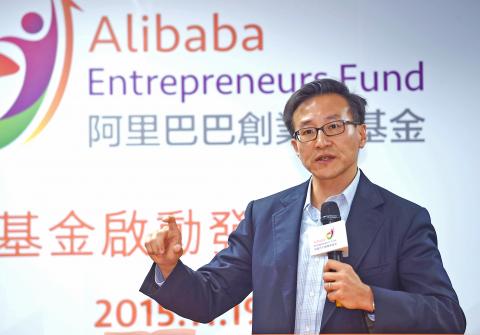Alibaba Group Holding Ltd (阿里巴巴) yesterday launched a NT$10 billion (US$304.32 million) fund to invest in Taiwanese start-ups, with the objective of supporting companies that plan to utilize the resources offered by Alibaba’s ecosystem.
The Taiwan Entrepreneurs Fund (台灣創業者基金) is to be under the control of executive director Andrew Lee (李治平), who was formerly the chief financial officer at Entie Commercial Bank Ltd (安泰銀行), Alibaba said.
The fund’s board of directors has picked the China Development Industrial Bank (中國開發工業銀行) as its investment manager to evaluate the business potentials and feasibility of the proposals put forward by local start-ups, Alibaba executive vice chairman Joseph Tsai (蔡崇信) said.

Photo: Fang Pin-chao, Taipei Times
Tsai said chairman Jack Ma (馬雲) has been discussing how to assist Taiwan’s young entrepreneurs since Ma visited Taiwan in the beginning of this year.
“Alibaba’s mission is to make it easy to do business anywhere. We hope this initiative can solve Taiwanese start-ups’ common funding problems,” Tsai told a press conference in Taipei.
“The fund is not a charity. We want to invest in the most promising start-ups that put forward the best ideas,” Tsai said.
Tsai said Alibaba or the fund would not control the selected start-ups or intervene in their operations.
“However, we require start-ups to share profits with the fund or return the investment to it once they become profitable, so the fund can sustain itself and continue to help other start-ups,” Tsai said.
Lee said the start-ups that wish to apply for funding must be run by Taiwanese. Moreover, their products or services have to take part in Alibaba’s ecosystem of e-commerce, logistics, mobile platforms, cloud computing or financial services.
“The project offers the firms Alibaba’s resources. We hope the start-ups take part in Alibaba’s ecosystem,” Lee said.
China Development Industrial Bank president Paul Yang (楊文鈞) said that as an investment manager, the bank would initially prefer to receive proposals that focus on industries in e-commerce or the Internet.
“We would prefer to see innovative ideas that could fully utilize Alibaba’s business ecosystem,” Yang said.
The proposals would need to demonstrate that the start-ups are outstanding companies in Taiwan with highly differentiated products in the market, he said.
Earlier yesterday, Alibaba also set up a HK$1 billion (US$129 million) fund to invest in start-ups in Hong Kong.
China’s largest e-commerce operator selected Gobi Partners Inc as the manager of the non-profit fund in the territory, which is to support online and brick-and-mortar companies, and provide six to 12-month Alibaba internships to about 200 students each year, the company said in a statement.

TAKING STOCK: A Taiwanese cookware firm in Vietnam urged customers to assess inventory or place orders early so shipments can reach the US while tariffs are paused Taiwanese businesses in Vietnam are exploring alternatives after the White House imposed a 46 percent import duty on Vietnamese goods, following US President Donald Trump’s announcement of “reciprocal” tariffs on the US’ trading partners. Lo Shih-liang (羅世良), chairman of Brico Industry Co (裕茂工業), a Taiwanese company that manufactures cast iron cookware and stove components in Vietnam, said that more than 40 percent of his business was tied to the US market, describing the constant US policy shifts as an emotional roller coaster. “I work during the day and stay up all night watching the news. I’ve been following US news until 3am

UNCERTAINTY: Innolux activated a stringent supply chain management mechanism, as it did during the COVID-19 pandemic, to ensure optimal inventory levels for customers Flat-panel display makers AUO Corp (友達) and Innolux Corp (群創) yesterday said that about 12 to 20 percent of their display business is at risk of potential US tariffs and that they would relocate production or shipment destinations to mitigate the levies’ effects. US tariffs would have a direct impact of US$200 million on AUO’s revenue, company chairman Paul Peng (彭雙浪) told reporters on the sidelines of the Touch Taiwan trade show in Taipei yesterday. That would make up about 12 percent of the company’s overall revenue. To cope with the tariff uncertainty, AUO plans to allocate its production to manufacturing facilities in

COLLABORATION: Given Taiwan’s key position in global supply chains, the US firm is discussing strategies with local partners and clients to deal with global uncertainties Advanced Micro Devices Inc (AMD) yesterday said it is meeting with local ecosystem partners, including Taiwan Semiconductor Manufacturing Co (TSMC, 台積電), to discuss strategies, including long-term manufacturing, to navigate uncertainties such as US tariffs, as Taiwan occupies an important position in global supply chains. AMD chief executive officer Lisa Su (蘇姿丰) told reporters that Taiwan is an important part of the chip designer’s ecosystem and she is discussing with partners and customers in Taiwan to forge strong collaborations on different areas during this critical period. AMD has just become the first artificial-intelligence (AI) server chip customer of TSMC to utilize its advanced

Six years ago, LVMH’s billionaire CEO Bernard Arnault and US President Donald Trump cut the blue ribbon on a factory in rural Texas that would make designer handbags for Louis Vuitton, one of the world’s best-known luxury brands. However, since the high-profile opening, the factory has faced a host of problems limiting production, 11 former Louis Vuitton employees said. The site has consistently ranked among the worst-performing for Louis Vuitton globally, “significantly” underperforming other facilities, said three former Louis Vuitton workers and a senior industry source, who cited internal rankings shared with staff. The plant’s problems — which have not